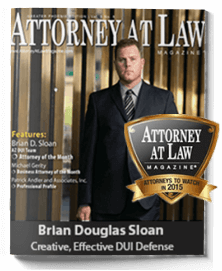Interviewer: What’s the potential time frame for overturning a conviction?
The Process May Take Several Months
Brian Sloan: This process falls under what is called Rule 32. When I file a petition under Rule 32, the prosecutor typically has a certain time frame in which they respond. Then once they respond, I’m allowed to reply to that, and the court can then set a hearing. So this tends to be a couple month process, and the clients may need to make a court appearance.
So far I’ve been able to handle everything just by way of motions, and my client has not needed to appear in court, although again we are dealing with a new issue that the courts aren’t really familiar with. I do have one client where the courts are saying, “Have your client show up to court.”
Basically the court has indicated that they are agreeing with me in my request to overturn, and the prosecutor is agreeing with me in my request to overturn, but the court wants my client to show up. I’m not exactly sure why, probably to find out what my client’s address is, or maybe to say, “Here’s your payment,” so that the court can directly provide payment over to my client as opposed to going through me.
What Information Can You Provide When Meeting with an Attorney to begin the Process of Overturning a Past Drug-Related DUI Charge?
Interviewer: When I meet with you, what information should I provide you with?
Brian Sloan: Basically just give me a call. If they believe they’ve only had the inactive metabolite in their system, they can give me a call. I can try and see what I can figure out on the computer. On my computer I should be able to tell what they pled guilty to, but not necessarily what was in their system at the time. It can give me a pretty good idea, if I can figure out what they pled guilty to, whether they have overcome the first hurdle, that they be convicted of ARS 28-1381A3.
Bring Copies of the Original Police Report and Plea Agreements, If You Have Them
After that, if they have the police report, that becomes very helpful. If they have a copy of the plea agreement, that becomes very helpful. Otherwise it may take some research on my part to go to the court and possibly to the police station to get a copy of the police report and find out exactly what was in the person’s system, and what it states in the police report, and what they pled guilty to.
If You Are Still Undergoing Penalties Associated with the Previous Conviction, You Must Continue to Do So While the New Case Is Pending
Interviewer: Are there any barriers that I might face along the way?
Brian Sloan: If the person is still going through their punishments, if they are still dealing with their license revocation, or license suspension, if they’re still on probation, if they’re still paying off their fines and fees, chances are they’re going to have to continue doing that until the case is resolved. This is something where it doesn’t require a lot of their involvement.
I can basically take care of everything. It shouldn’t lead to any unexpected hardships. Basically the person just wants to keep doing what they’re doing and hope that they fall into the specific category where we can possibly get the case overturned and declare them innocent, so that they can move forward with their life DUI-free.
It Is Important to Inform the Attorney If You Have Any Subsequent Convictions
Interviewer: Is there any additional information I should let my attorney know in regards to the details of my conviction that might expedite the process?
Brian Sloan: The only thing that I can think of is if there have been any subsequent convictions. We definitely don’t want to put our client in a more detrimental position. I can imagine that, if someone had subsequent DUI convictions, we could possibly end up putting someone in a serious position by getting the case overturned.
I’ll use the example of a case of a driver that had two subsequent DUI convictions. It’s as if they are there on Day 1; but, because they have two subsequent DUIs at that point, they could end up being charged with a felony. So that’s the only instance that I can really think of where you need to be a little cautious. There’s a little more information that I would need as an attorney in order to ensure that the client doesn’t put themselves in a more serious position.
Because the Process Is New to Arizona Courts and Arizona’s Department of Motor Vehicles, It Is Unspecified How Long It Will Take to Enact Changes That Accompany a Case Being Overturned
Interviewer: Let’s say I’ve had my case successfully overturned. How long is it going to take for these changes to be made in the case because I’m actually looking for employment right now?
Brian Sloan: It may take a while. We don’t know, because this is new territory. I don’t know how long it’s going to take the court to refund my client. I don’t know how long it’s going to take the Motor Vehicle Division to erase the indication in the Motor Vehicle Division record. We really don’t know. We’re in new territory.











